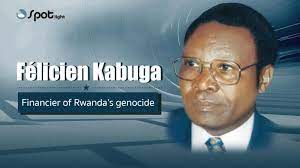
The trial of Félicien KABUGA started on September 29th 2022 in The Hague courtroom of the Residual Mechanism for the International Criminal Tribunals. The accused is charged with six counts: One count of Genocide, One count of Direct and Public Incitement to Commit Genocide, One count of Conspiracy to Commit Genocide and Three counts of Crimes Against Humanity, namely Persecution on political grounds, Extermination, Murder.
Direct and Cross examination of witness KAB007.
Mr. Félicien Kabuga was physically present in the courtroom.
After a week’s break, the Court was back in session with the examination of witness KAB007, who participated via a livestream from the Arusha branch. In order to protect the witness’ identity, most of the hearing was conducted in camera. The witness, is a former member of the Interahamwe militia.
In the beginning, the prosecution briefly summarized a testimony the witness had given previously. According to the testimony, the youth wing of the MRND, formally known as “JMRND” became the Interahamwe in November 1991. The Interahamwe received military training in 1993 and then transformed into a militia. According to the witness, instead of protecting, the Interahamwe attacked the population. KABUGA was a prominent MRND member and provided office space for free in his building in KIGALI and in 1993, he also bought uniforms for the Interahamwe. The testimony further reads that on the 25th of April 1994, KABUGA chaired a meeting that was also attended by Mathias NYAGASAZA and Anatole NSENGIYUMVA. In the meeting, KABUGA pledged to buy weapons to fight the “enemy”, which, according to witness KAB007 was no longer the RPF, but the Tutsi.
End of May 1994, according to the statement, KAREMERA announced that the weapons had arrived in GOMA. In connection with this, the witness described two trucks – with KABUGA’s name written on them – that arrived at the MERIDIAN HOTEL in GISENYI, alongside a bus. At the hotel, NSENGIYUMVA and KAREMERA were present alongside KABUGA and he congratulated them. The witness explained that the weapons provided by KABUGA were distributed to the Interahamwe who used them to kill Tutsi in the KIBUYE prefecture. The witness further said that the persons who picked up the weapons in Goma were appointed by Colonel ANATOLE. The vehicles drove in front of the hotel, the drivers stopped and gave papers to KABUGA, then they continued towards the military camp. After that, one of the trucks went to the UMUGANDA STADIUM, where they gave the weapons to those who had just finished their military training. The witness was present and when the young soldiers left for Kigali after sunset, he accompanied them with his own car. The defence put to the witness a question requiring him to explain why he accompanied them, but the witness did not want to answer in public for fear of being recognized. The rest of the hearing continued in camera.
This note is a communication from the “Justice and Memory” program which aims to strengthen the involvement of affected populations and local actors, in international and national trials related to the genocide perpetrated against the Tutsi, treated on the basis of the universal jurisdiction, in order to consolidate unity, reconciliation, the perpetuation of the memory of the genocide and social cohesion in Rwanda.
The program is implemented by RCN Justice & Democracy, PAX PRESS, Haguruka and Association Modeste et Innocent (AMI). The program follows the course of the proceedings in the trials of genocide cases based on the universal jurisdiction and informs impacted populations on the progress of the cases.
The program receives financial support from the government of Belgium through the Directorate General for Development (DGD). The program also receives occasional support from the Embassy of France in Rwanda. Program communications do not engage the responsibility of the DGD or the Embassy of France.
